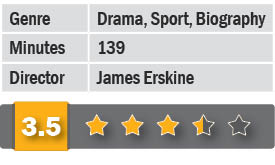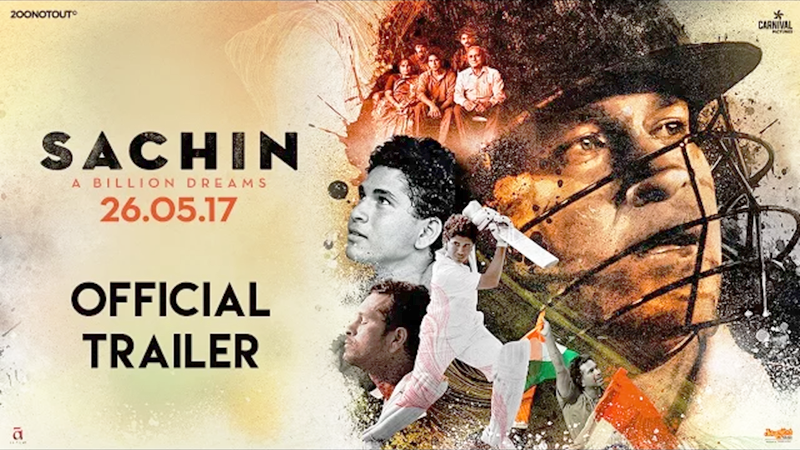 The average Indian’s twin obsessions (pun intended) are cricket and cinema. In making the docu-drama ‘Sachin’, director James Erskine certainly holds the perfect curriculum vitae, having made films on the world’s three greatest sports — Football (‘One Night in Turin’, ‘Shooting for Socrates’), Tennis (‘Billie Jean King’) and yes, even Cricket (‘From the Ashes’, of Botham’s heroics which reversed the fate of the 1981 Ashes, similar to Dravid-Laxman’s doughtiness during the 2001 India-Australia series.
The average Indian’s twin obsessions (pun intended) are cricket and cinema. In making the docu-drama ‘Sachin’, director James Erskine certainly holds the perfect curriculum vitae, having made films on the world’s three greatest sports — Football (‘One Night in Turin’, ‘Shooting for Socrates’), Tennis (‘Billie Jean King’) and yes, even Cricket (‘From the Ashes’, of Botham’s heroics which reversed the fate of the 1981 Ashes, similar to Dravid-Laxman’s doughtiness during the 2001 India-Australia series.
Reams have been written on those billion dreams. There is nothing of his exploits on the cricket field which the Sachin fan wouldn’t know, most notable of them being the record holder for most number of runs and centuries in international cricket. On field though, the subject of ‘a billion dreams’ was the object of eleven men, mostly non-Indian, out to get his scalp. But the intention of the filmmakers seems to go much beyond that — archival and current footage of his family is shown, especially of wife Anjali and children Sara and Arjun. Some of his personal anecdotes are also within the public domain — he was named after the legendary music composer Sachin Dev Burman (his family was music minded); he was a mischievous b(r)at in his childhood, getting upto all sorts of pranks.
The film begins with two parallels — a young chubby lad with bushy, curly hair upto all kinds of practical jokes, restrained only by his eldest brother Nitin (played by Mayuresh Prem with a striking resemblance to him). Aptly, the reticent Nitin is the first from the family whose quotes we get to hear. The opening frames also show Sachin, the father, holding a newly-born Sara close to his bosom.
The film covers at length brother Ajit (with whom Sachin shared the closest bond) accompanying him to his first coach Ramakant Achrekar; Sachin’s formative years; his exploits on the field — being fastidious but not suppositious; snippets of bytes from Wadekar, Laxman, Dravid, Dhoni, Ganguly, Sehwag, Vivian Richards, Wasim Akram or from his BFF Sameer Dighe and Atul Ranade; excerpts of his retirement speech in November 2013; receiving the Bharat Ratna; his reactions to the match fixing scandal – which is probably the reason there are no snippets from Azharhuddin, Jadeja or Prabhakar; his father’s death – and how on his mother Rajani’s insistence Sachin rushed back to England during the 1999 World Cup to score an emotional century against Kenya.
But the best parts of the film are reserved for the tender moments with his family — Anjali, in all frankness, found him at first sight cute, chubby (and, though she doesn’t mention it, probably cuddly too!) and how he felt humiliated when the selectors removed him from captaincy without even the basic courtesy of informing him.
The cinematography by Chris Openshaw is good and AR Rahman’s background score fits in perfectly with the sound engineers’ loud refrain of ‘Sachin Sachin’ reverberating throughout the vast cricket stadia. Erskine manages to show that the average Indian cricket fan is bipartisan, with loud cheers also reserved for the — 1996 World Cup when Venkatesh Prasad dismissed Aamir Sohail, bare–chested Ganguly waving his T-shirt, Dhoni’s six to win the 2011 World Cup or the 2001 Laxman – Dravid marathon partnership. He also wears his heart on his sleeve when speaking against Greg Chappell’s divisive policies.
But as a cricket fan and a film critic, I found that the film does hit a few dark spots — his Parliament attendance record, the Ferrari tax issue or the infamous monkey–gate drama where he was the prime witness — none of which is covered. Also, no quotes from Vinod Kambli, with whom he shared an unbroken 664-run partnership in 1988, or from Lalchand Rajput and K. Srikanth — his first captains in the Ranji Trophy and Tests respectively.
All things considered, Sachin Ramesh Tendulkar remains a cricketing genius, a living legend and a national icon, and all analysis of his life has to be considered on the basis of his on-field exploits — nothing more, nothing less.
- Sau Saal Pehle… Celebrating Mohammed Rafi’s Birth Centenary - 21 December2024
- Parsee Gym Retains Supremacy In 7th Late Manek Golvala T10 Cricket Cup - 13 April2024
- Parsee Gym Holds 9th All-Parsee TT Tourney - 6 April2024
